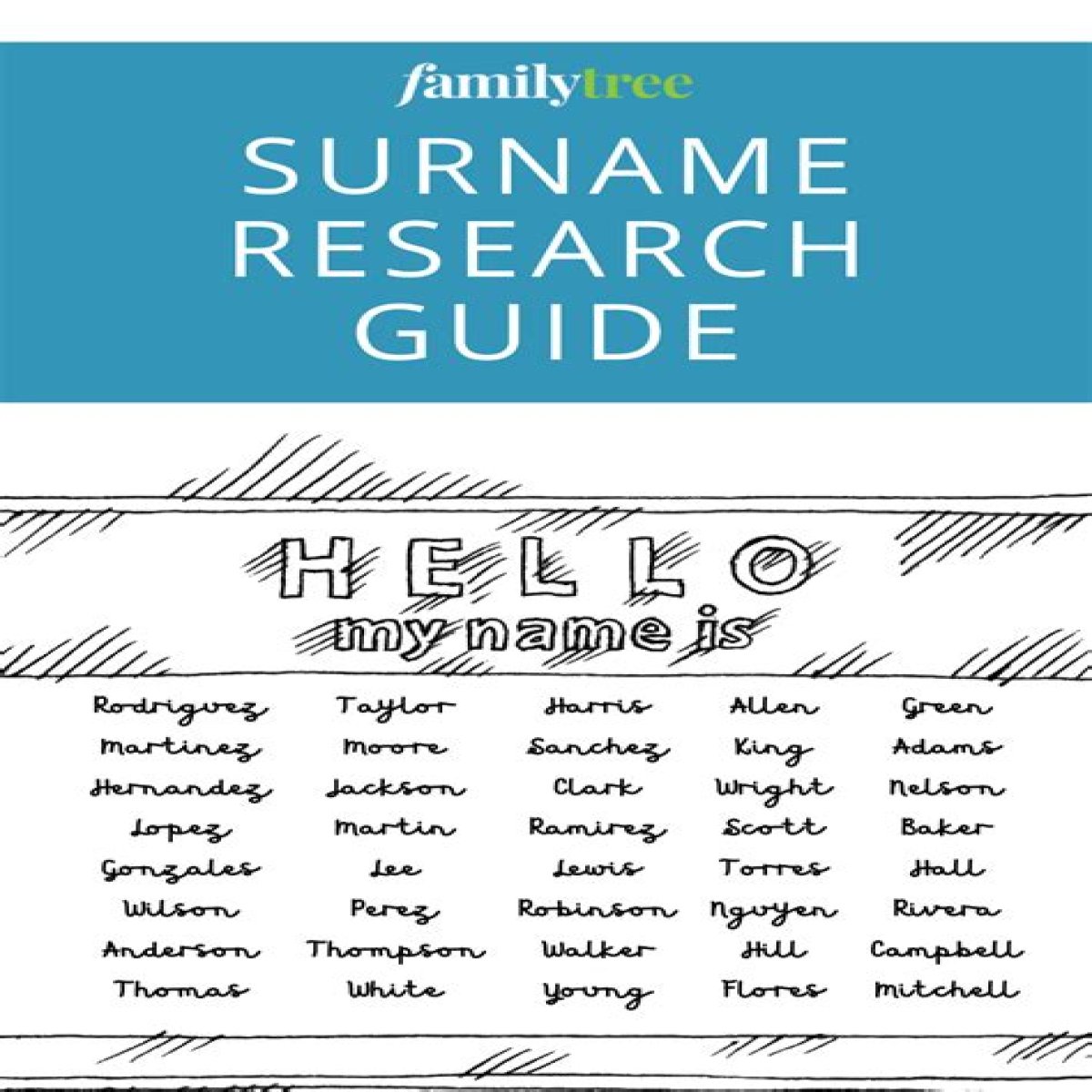Surnames, a testament to our heritage, are a fascinating and diverse aspect of our identities. They carry within them stories of our ancestors, the places they've lived, and the cultures they've shaped.
Surnames, also known as family names or last names, are passed down from generation to generation, connecting us to our lineage and providing a sense of belonging. They can be derived from a variety of sources, including occupations, physical characteristics, geographical locations, and personal traits.
The importance of surnames extends beyond their historical and cultural significance. In many societies, they play a crucial role in legal and administrative matters, helping to identify individuals and establish family relationships. Surnames can also be a source of pride and distinction, reflecting the accomplishments and contributions of our ancestors.
Let's explore some of the key aspects that make surnames so cool:
: Surnames as a Source of Pride and Distinction
Introduction: Set the context of "Pride and Distinction" in relation to "surnames cool", emphasizing its relevance.Facets:Family Legacy: Surnames carry the weight of family history, accomplishments, and reputation. Personal Identity: Surnames shape our sense of self and contribute to our unique identity.Social Status: Surnames can sometimes indicate social standing or privilege within a community. Summary: Link facets back to the main theme of "surnames cool" or expand the discussion.Explore the connection between "Pride and Distinction" and "surnames cool" for content details. Never use first and second-person pronouns and AI-style formalities. --> Introduction: Focus on the connection between "Historical Research" and "surnames cool", considering cause and effect, importance, and practical significance.Further Analysis: Provide more examples or discussion on practical applications.Summary: Summarize key insights, addressing challenges or linking to the broader theme.Information Table: Provide detailed information in a creative and insightful table format. -->Frequently Asked Questions About Surnames
This section addresses some of the most common questions and misconceptions surrounding surnames, providing informative answers to enhance your understanding.
Question 1: Why are surnames important?
Surnames serve several important purposes. They provide a sense of identity and belonging, connecting us to our family lineage and cultural heritage. Surnames also play a crucial role in legal and administrative matters, helping to identify individuals and establish family relationships. Additionally, surnames can be a source of pride and distinction, reflecting the accomplishments and contributions of our ancestors.
Question 2: How did surnames originate?
Surnames originated as a way to distinguish between individuals with the same given name. Initially, they were often derived from occupations, physical characteristics, geographical locations, or personal traits. Over time, surnames became more fixed and were passed down from generation to generation. The specific origin of a surname can vary widely depending on the culture and time period.
Question 3: Can I change my surname?
In most countries, individuals are legally permitted to change their surnames. The process for doing so may vary depending on the jurisdiction. Common reasons for changing a surname include marriage, divorce, adoption, or personal preference.
Question 4: What is the difference between a surname and a last name?
The terms "surname" and "last name" are often used interchangeably. However, in some cultures, there may be a distinction between the two. A surname is typically the family name or lineage name, while a last name is the final name in a person's full name.
Question 5: How can I research my surname's history?
There are several ways to research the history of your surname. You can consult historical records, such as birth certificates, marriage certificates, and census records. Additionally, there are online resources and databases that can provide information on the origin and distribution of surnames.
Question 6: What are some of the most common surnames in the world?
The most common surnames in the world vary depending on the region and culture. However, some of the most frequently occurring surnames globally include Smith, Johnson, Williams, Jones, and Brown.
Question 7: What are some of the most unusual surnames?
There are many unusual and unique surnames around the world. Some examples include Moon, Apple, Winter, Fox, and Stone.
Question 8: What is the longest surname in the world?
The longest surname in the world is believed to be "Pfisterer-Vogenohl-Gindele-Hummel-Keuppler-Roth-Meier-Grohe-Schmeiser-Eisenlohr-Drachenberger-Guckenheimer."
Summary: Surnames are a fascinating and important part of our cultural heritage. They provide a sense of identity, connect us to our ancestors, and can be a source of pride and distinction. The history of surnames is rich and diverse, and there are many resources available to help you learn more about the origin and meaning of your own surname.
Conclusion
In conclusion, surnames are a fascinating and integral part of our lives. They provide a sense of identity and belonging, connecting us to our cultural heritage and family lineage. Surnames can also be a source of pride and distinction, reflecting the accomplishments and contributions of our ancestors.
The exploration of "surnames cool" has revealed the rich history, diversity, and significance of surnames around the world. From their origins as a way to distinguish between individuals to their current role in legal and administrative matters, surnames have played a crucial role in shaping our societies and cultures.
The Legendary Love Cannon: A Timeless Romance ToolDiscover Intriguing Last Names: A Comprehensive Guide To Unique SurnamesHow Tall Was Young Dolph? Find Out His Surprising Height
